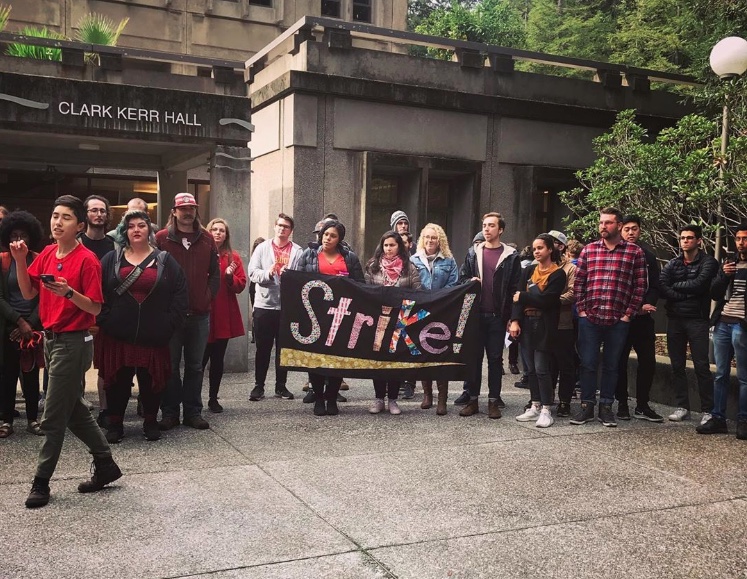A Wildcat Strike at UC-Santa Cruz
Graduate student workers at University of California, Santa Cruz are on wildcat strike until they're paid a living wage.

Strikers gather on UC-Santa Cruz's campus. payusmoreucsc / Instagram
Graduate student workers at the University of California, Santa Cruz (UCSC) are on wildcat strike, withholding final grades for the fall quarter unless their demand for a Cost-of-Living Adjustment (COLA) is met. They are demanding an additional $1,412 a month, for all UCSC graduate students regardless of employment or citizenship status, to bring them out of rent burden. On Wednesday, December 18, the official due date for the grades, hundreds of grad workers refused to submit grades, substantially disrupting the operation of the university.
Santa Cruz is one of the most expensive places to live in the country, with its skyrocketing rent fueled by the nearby Silicon Valley. Most grad workers pay the majority of their income on rent, with many paying 70-80 percent. The wildcat strike comes in the wake of the failure of previous efforts to address the crisis.
The current statewide UAW Local 2865 contract contains only 3 percent wage increases and no housing subsidy or a COLA, despite housing insecurity being the top concern statewide; the inadequate contract was rammed through in August 2018 by the bureaucratic statewide union leadership through dubious and anti-democratic means, with 83 percent in Santa Cruz and 42 percent statewide rejecting it. Housing affordability in Santa Cruz was dealt a further blow by the defeat of Measure M, a municipal rent-control bill, in fall 2018 by landlord forces in town.
These defeats led UCSC workers to demand a substantial COLA at the campus level. COLA organizers, who won leadership of both Santa Cruz chapter of the statewide union UAW Local 2865 as well as the Graduate Student Association (GSA), have been building the campaign throughout the fall, starting with a joint union-GSA mass meeting on COLA in September. On November 7, several hundred grad students — out of only around 1,800 in total — marched to the administration building and officially presented a COLA demand to the Chancellor. The success of the first action led to an all-day “COLA camp-out” on the following Tuesday and a series of meetings and teach-ins, keeping visible movement presence throughout the day at the entrance of campus and further developing the movement.
The events escalated dramatically in the first week of December. On December 5, one worker sent an angry email to the management denouncing that “your silence and inaction reveal you as an enemy.” The retaliatory management email, ominously invoking the student code of conduct, prompted a further flurry of angry emails by grad workers. Due to the use of mass listservs, the entire exchange was shared by much of the grad student body.
By that evening, calls for a grading strike erupted spontaneously from the rank-and-file, in these email chains, taking even organizers by surprise. COLA organizers promptly seized the moment, calling the General Assembly on Sunday, December 8. More than 250 grad workers attended the GA in person and online, and collectively decided on a grade strike by a landslide margin, after thorough discussions of the advantages and risks of a wildcat strike.
Since the strike began, the strikers’ priority has been to build a base in every department through departmental strike committees and to win support from undergraduate students and faculty, both of who have overwhelmingly supported the strike. Many departments have officially declared support for the demand and committed to non-retaliation. The strikers have been working long hours in numerous committees, including departmental-level organizing, outreach to various groups, graphic design, legal support, website, and social media.
Since it is the “online picket line” that they are upholding — they continued to proctor the final exams and graded them, without submitting them online and deleting the previously-submitted grades — and most grad workers are away from campus for the holidays, the strong online presence has been particularly crucial in maintaining the strike.
UCSC administration has refused to meet with the strikers, despite their union and GSA representatives repeatedly offering to do so. Despite the management’s initial claim that they “want to engage” with the workers, when the workers set up an open meeting with the management on December 10, they failed to show up. Since then, the administration has done nothing except continue sending emails containing vague platitudes about “developing solutions” while intimidating the strikers with baseless claims of “illegality,” and seeking to enlist faculty to scab, with limited success.
While the administration dithers, UCSC wildcat strikers have received strong support from other campuses and labor organizations. More than 1,800 supporters signed the general solidarity petition, the strike fund collected more than $8,000, and solidarity statements came from more than thirty organizations locally, nationally, and globally — including by the United Teachers of Los Angeles, who organized a successful strike this year. The wildcat strike has had a particularly electrifying effect on other University of California campuses, sparking rallies in support of UCSC’s wildcat strike and to demand our own Cost of Living Adjustment at UC Berkeley, Davis, Los Angeles, and Santa Barbara.
The ongoing wildcat strike at UCSC is the most significant action by student-workers in the UC system in many years. The demand is simple, universal, and ambitious. The striking workers are ready to escalate the struggle in the new quarter in January, if they do not win before then.